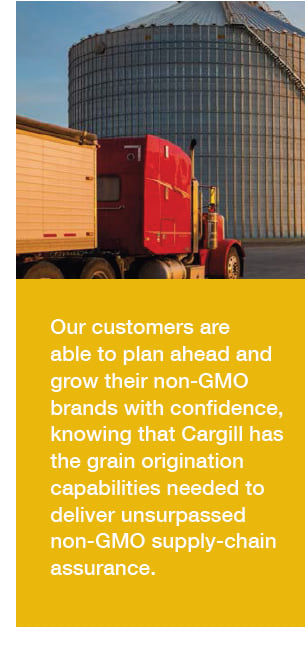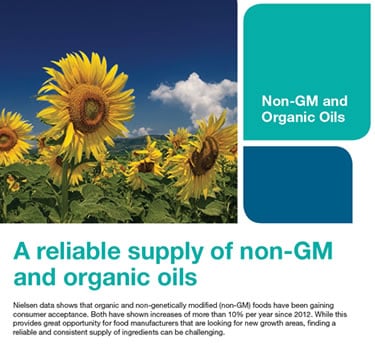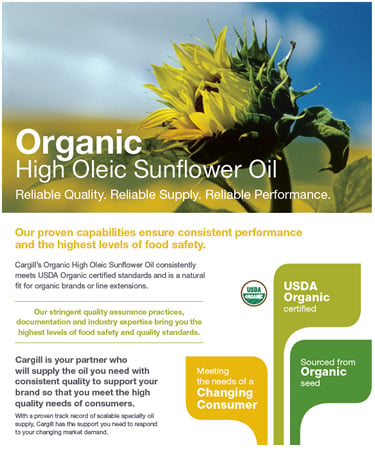Non-GMO is one of the fastest growing claims in the U.S. food industry*. For over 15 years Cargill has worked with food and beverage manufacturers to help them navigate non-GMO supply chain challenges, source non-GMO ingredients, and grow their non-GMO business. From dedicated producer programs to the industry’s broadest ingredient portfolio, Cargill is the right partner to help grow and protect brands by delivering non-GMO products to consumers.
Cargill has the Broadest Portfolio of Non-GMO Ingredients
From sweeteners, starches and texturizers to oils, cocoa and chocolate, Cargill delivers scale that food manufacturers need to get to market quickly and meet growing consumer demand for non-GMO products. We market a growing number of Non-GMO Project Verified ingredients so customers can feature America’s most recognizable non-GMO claim on their labels.
 Cargill Non-GMO Ingredients
Cargill Non-GMO Ingredients
• Sweeteners
• Starches
• Texturizers
• Oils
• Cocoa and Chocolate
• Fibers
• Flour and Ancient Grains
• Salt
Click here to download a brochure with more details on Cargill’s Non-GMO ingredients
Non-GMO Project Verification
Several commercially available Cargill food ingredients are Non-GMO Project Verified, including: erythritol, stevia, cane sugar, high oleic canola oil, high oleic sunflower oil, mid oleic sunflower oil, soybean oil, glucose heirloom syrup, dry corn (mill, grits, flour), corn syrup solids, maltodextrin, dextrin, modified food starch, chicory root fiber, and native starch.
Non-GMO Confidence. Global Assurance.
Cargill has extensive global experience and supply-chain operation to ensure confidence when helping food manufacturers source non-GMO crops and ingredients.
When our products are coupled with our global supply-chain assurances we can help food manufacturers manage the entire spectrum of challenges associated with reformulating products with ingredients sourced from non-GMO crops.
Meeting Consumer Demands has Never Been Easier
Every product is created with the consumer in mind. We create ingredients that consumers demand and that work across multiple formulations. Cargill’s diverse selection of non-GMO products sourced from around the globe make it easier than ever for manufacturers to provide non-GMO formulations.
Unsurpassed producer programs
Limited supply of non-GMO corn, soybeans and high oleic canola creates challenges for companies seeking to scale production to meet growing consumer demand. Cargill’s global footprint means we can source non-GMO ingredients worldwide to help our customers overcome unexpected supply-chain disruptions. Cargill’s non-GMO producer programs help our customers plan ahead and grow their non-GMO brands with the confidence that, Cargill, the world’s largest agrifood company, has the grain origination capabilities needed to deliver unsurpassed supply-chain assurance.
Market Insights that Lead to Winning Strategies
We conduct proprietary consumer research and utilize third-party studies to equip our customers with the insights needed to guide strategic decision making. We regularly consult with food industry leaders and government officials to ensure we understand the direction of regulatory policy. We have long-standing relationships with industry thought leaders such as the Non-GMO Project so that customers have insight relating to the direction of non-GMO in the future.
*There is no single definition of “Non-GM” in the U.S.A. Contact Cargill for source and processing information.
Some Cargill products are only approved for use in certain geographies, end uses, and/or at certain usage levels. It is the customer's responsibility to determine, for a particular geography, that (i) the Cargill product, its use and usage levels, (ii) the customer's product and its use, and (iii) any claims made about the customer's product, all comply with applicable laws and regulations.


